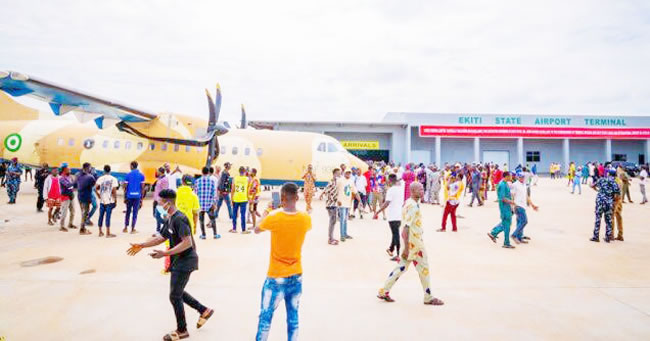

SHOLA ADEKOLA looks at the airports in the country and why creation of more unviable ones will continue.
THE Federal Airport Authority of Nigeria (FAAN), a government service organisation statutorily charged to manage all commercial airports in Nigeria, at present, has over 26 airports categorised as federal government-owned.

Aside from the federal government-owned airports, there are also state-owned airports whose number keeps increasing due to the insatiable urge by the different state governments to build airports in their domains even if such airports would later become liabilities to their states afterwards.
About four years ago, there were about 22 airports owned by the federal government, but the number kept increasing as most of the moribund state-owned airports are coercively transferred to FAAN to add to the list of federally owned airports.
Of all the 26 federal government-owned airports scattered around the country, only three or four have been found to be viable while the remaining 22 are just occupying space with the active four servicing the needs of the unviable or inactive airports.
The four topmost airports are: the Murtala Muhammed International Airport, Lagos, Nnamdi Azikwe International Airport, Abuja, Mallam Aminu Kano International Airport and probably Port Harcourt International Airport in Port Harcourt, Rivers State.
Among the non-profitable or viable federal government-owned airports include those sited in Akure, Katsina, Benin, Dutse, Nassarawa, Bauchi, Ebonyi, Ibadan, Calabar, Yobe, Kebbi, Benue, Zamfara and others.
The non-viability of a majority of the airports, which has become a burden on FAAN, has again become complicated with the reckless manner some state governments have turned the government agency to a dumping ground where they push the unprofitable state-owned airports many of which cannot boast of 10 flights in a year.
Of all the country’s airports, the big four, particularly the Lagos airport, are the ones laying the golden eggs that others perch on for survival. At different forums, stakeholders, who have described the continuous allocation of budgets for the running of the unviable airports as a waste of public funds, have thrown their weights behind the planned concession/privatisation of the airports.
FAAN MD speaks
Confirming the poor performance of many of the airports at an Airport Business Summit and Expo 2024 at the Lagos airport, the Managing Director of FAAN, Mrs Olubunmi Kuku, expressed her frustration with the inefficiency of some of the airports, revealing that a majority of the airports are operating below capacity despite fund allocations.
She particularly cited the Minna airport as an example, where despite FAAN having 122 workers, the airport cannot boast of a single flight.
Key players react
As the poor status of the airports continues to generate negative reactions among the different interest groups, with some blaming the situation on the failure of the relevant aviation authorities to enforce the rules guiding airline operations and the regulations required for building airports, others are of the opinion that most of the airports should not have existed in the first place and/or approved by the regulating agencies. They posited that some of the airports were built either for sentimental reasons that my state must have an airport or merely to make political statement. They cited corrupt tendencies as another factor that fuelled airport projects in some states.
Commenting on the large number of inefficient airports, the managing director of Centurion Security and a former military commandant at the Lagos airport, Group Captain John Ojikutu (retd.), declared: “The federal airports are mostly politically established so also are the state airports. How many of the locations of these airports are economic centres or are economically viable or attractive besides Lagos, Abuja, Port Harcourt and Kano? Onitsha and Aba could have attracted airports, but politics pushed the choice to Enugu and Asaba instead of Onitsha and Owerri and Port Harcourt instead of Aba. As close as Lagos is to Ibadan, the traffic in Lagos has been increasing much more than the increase in the traffic in Ibadan.
“Lagos can benefit more from intermodal metro airports in Lekki to cater for passengers coming to Murtala Muhammed International Airport (MMIA) from Ikoyi, Victoria Island, Lekki and Epe and another at Badagry and Ikorodu for passengers coming from these areas facing road traffic to MMIA. Note that the Lagos airport that has over 50 percent of the total national traffic in passengers, cargo and air traffic is similar to the New York City that has about three airports and the city of London with about six metropolitan airports.”
Speaking on the inactive airports gulping huge funds from both the federal and states’ government purse, a former top management official at FAAN, Akinola Babson, laid the blame at the doorsteps of the aviation regulatory body, the Nigeria Civil Aviation Authority (NCAA), accusing it of compromising in its oversight functions.
Akinola said: “Unviable airports are creation of political desperation of the state governors to fleece their states of their resources. The state governments’ decision to establish airports without feasibility reports to determine the passenger and cargo traffic is fraught with fraud to make money from such projects without proper managerial considerations, viability of recouping the costs of establishing the airports. Some state governors are interested in the percentage of the cost of constructing the state airport that would be collected from the contractors handling the project.
“Take South-West geopolitical zone as a case study. If Boeing 737 takes off from MMIA, the aircraft will overshoot Ladoke Akintola Airport (LAA) runway because it will not attain landing altitude before it reaches LAA because of the proximity between MMIA and LAA, ditto for Ilorin and Akure airports. The regulatory power of NCAA has been compromised and politicised, otherwise, the regulator is in good stead to prevent the proliferation of unviable airports in the country.
“However, there is no reason for the federal government to continue to accept the responsibility of maintaining the state airports, when such airports are not viable. Such policy would mean being penny wise, pound foolish,” Babson explained, adding that regardless of the investment, any airport that is not viable and/or profitable as a domestic airport, is not likely to be profitable even if remodelled or with improved infrastructure. “There is no assurance that remodelling [an unviable domestic airport] will make it viable,” he stressed.
In his own contribution, the Chief Executive Officer of Selective Security International, Ayo Obilana, absolved aviation authorities of blame, submitting that they should not be blamed for the proliferation of airports or the idea of governors constructing airports in their states. “My comment is simple. About Nigerians accusing aviation authorities on proliferation of unviable airports in Nigeria, aviation authorities have no blame at all, because most of the unviable airports were built on sentimental political exigency by politicians who wanted them at all costs to serve as their contributions for their domains and to some extent [enhance their] ‘status symbols’.
“Also they (politicians) ignored advice of technocrats in the industry and went ahead to use their political influence and power to ensure presence of airports in some of the states despite the advice of being unviable.”
Trend will continue…
But in spite of the huge financial burden the federal government through its agencies like FAAN and NCAA shoulders to maintain these unviable airports, it appears that the trend would continue given the government’s unwillingness to address the challenge.
The Minister of Aviation and Aerospace Development, Festus Keyamo, revealed this much at the 9th Airport Business Summit and Expo, which was held on 21 August, in Lagos. Represented by the Permanent Secretary of the Ministry Dr. Emmanuel Meribole, Keyamo expressed the government’s desire to continue supporting the country’s airports and making them viable.
Keyamo, who delivered the keynote address that the summit stated that “airport viability is not just a priority but a necessity for any ambitious aviation business.” But while he outlined several critical factors essential to achieving airport viability, including “sustainable financial models, operational efficiency and motivation, infrastructure development, environmental sustainability and the strategic use of Public Private Partnerships (PPPs),” he left out a critical factor which is patronage and traffic buoyed by economically active citizens operating in a growing, solvent economy. Unfortunately, the Nigerian economy is depressing sharply throwing many hitherto economically active citizenry into the pool of insolvency and has caused a huge reduction in commercial activities in the country including traffic at the airports.








